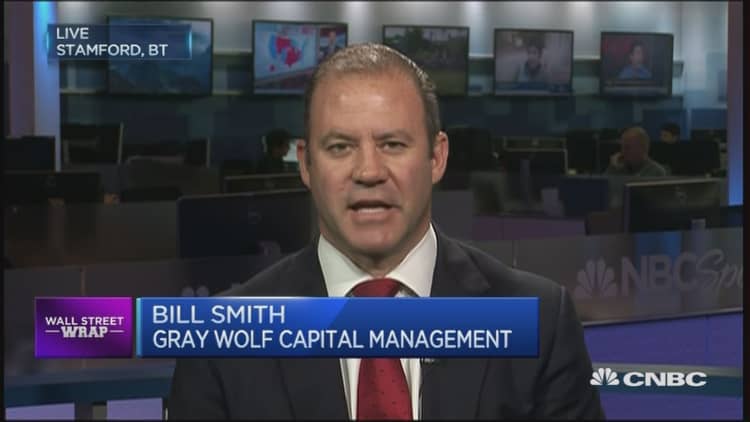Most Asian bourses eked out modest gains Tuesday after oscillating between positive and negative territory, as the world's most closely watched election drew near.
Market participants noted nervousness ahead of the U.S. presidential vote that has dominated global headlines.
"Traders were apprehensive in Asia Pacific because of an underlying fear of the presidential outcome," said Stephen Innes, senior trader at Oanda.
Aside from election jitters, China's trade figures and Australia's NAB business survey also dampened risk sentiment.
"The Chinese trade balance data were not encouraging at all, and if Donald Trump becomes president, this number will be even more vile. Hence we experienced a little rollercoaster for the Asian markets," Naeem Aslam, chief market analyst at ThinkMarkets, told CNBC.
Australia's ASX 200 closed up 0.13 percent, or 6.991 points, at 5,257.79, after initially trading up more than 0.3 percent. The index was supported by strength in its materials sub-index, which rose 1.43 percent, and its energy sub-index, which gained 1.49 percent. However, gains were capped by weakness in its financials sub-index, which was 0.59 percent lower.
In Japan, the finished down 0.03 percent, or 5.83 points, at 17,171.38, while South Korea's Kospi ended up 0.29 percent, or 5.8 points, at 2,003.38. The Hang Seng was up 0.3 percent as of 3:19 pm local time.
Chinese shares were higher, the closed up 0.47 percent, or 14.69 points, at 3,148.02 and the Shenzhen composite ended up 0.659 percent, or 13.626 points, at 2,080.435.

China's dollar-denominated exports declined 7.3 percent year-on-year in October, an improvement compared to September's 10 percent fall, while dollar-denominated imports slipped 1.4 percent..
Beijing also reported China's foreign exchange reserves for October fell by $45.7 billion to $3.121 trillion, the biggest decline in nine months, official data showed late Monday.
"This suggests a modest degree of intervention to slow the pace of yuan depreciation, on top of negative valuation effects," said Chang Wei Liang, FX strategist at Mizuho Bank, in a Tuesday note. "Market attention will be on dollar/yuan today given the decline in reserves and the release of Chinese trade data."
The was trading at 6.7762 against the dollar as of 3:20 pm HK/SIN, after the People's Bank of China (PBOC) set Tuesday's yuan midpoint fix at 6.781, after it last closed at 6.7769.
In other economic news, Australia's monthly NAB business survey of more than 500 companies found that business conditions in October softened.
The news on Monday that the Federal Bureau of Investigation (FBI) had again cleared Democratic nominee Hillary Clinton over her use of a private server helped drive global equities higher.
"The market is telling you they feel Clinton has the election in her sights and judging by the strong moves in healthcare ... The view is we see the Democrats take back the Senate and the Republicans retaining the House, although the race for the Senate in actuality is a 50/50 proposition," Chris Weston, chief market strategist at IG, said in a Tuesday note.
The climbed 2.08 percent to close at 18,259.6. The S&P 500 index ended up 2.37 percent at 2,131.52, led by strong gains in healthcare. The composite surged 2.37 percent to 5,166.17.
The latest developments in the U.S. election campaign have also seen a move away from safe haven assets.
The yen weakened from levels of around 103 last week to trade at 104.40 against the dollar as of 3:20 pm HK/SIN, after gaining strength on Monday in Asia.
started to inch up 0.26 percent in Asian trade to $1,284.80 an ounce, but still below highs of $1,304 from last week.
In other news, Japan's Brother Industries jumped 7.38 percent to 1,980 yen per share, after it raised its operating profit outlook for the year ending March 2017 by 13.4 percent to 55 billion yen ($526.67 million) because of cost-cutting measures.
Incitec Pivot was trading down 1 percent, at A$2.96 a share, after the explosive chemicals and fertilizer maker reported a 26 percent fall in annual underlying profit from a year ago. The firm also warned that it expects markets for its key products to remain soft in 2017.
Commonwealth Bank of Australia share fell 0.63 percent to A$72.07 a share, after it posted flat first-quarter cash profit. The Australian lender attributed the result to margin pressures from higher funding costs.
Samsung Electronics' stock was up 0.24 percent to 1,644,000 won. On Tuesday morning, news broke that South Korean prosecutors raided the electronics giant's offices, as part of the influence-peddling investigation involving President Park Geun-hye.

The , which tracks the greenback against a basket of currencies, traded at 97.708, extending two straight days of gains.
The Australian dollar traded at $0.7701 against the greenback as of 3:21 pm HK/SIN, after heading as high as 0.77255 during the U.S. Monday session.
"The current direction of the AUD gives traders a clue of where the AUD could head, particularly if Clinton wins the US election and stocks continue to rally. The AUD/USD has had strong resistance at 0.7750 and year highs 0.7850, but a neutral RBA and resurgent China are powerful stimulants," said Anthony Darvall, chief market strategist at easyMarkets, in a note on Tuesday.
U.S. crude futures was unchanged, trading at $44.89 during Asian trade, after settling at $44.89 a barrel on Monday in the U.S. Brent futures traded at $46.28, up 0.28 percent from its Monday's settlement price of $46.15.
"Election odds remain quite tight and because for the first time in many years we will get early exit poll information, we would not rule out large market swings over the next 24 hours," said economists at Citi Research, in a Tuesday note.

